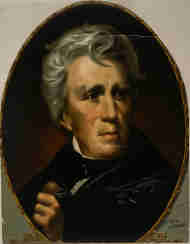Posted on May 26, 2006
Who's Who?
Media confuse allies with enemies
by
Daniel Clark
"Hundreds killed, thousands wounded in attack on New Orleans."

If people had read headlines like that in January of 1815, their natural conclusion would have been that the city had been sacked, and its inhabitants slaughtered. Nobody would have guessed that Andrew Jackson had just led the United States to one of the most decisive military victories ever recorded.
The headline of a hard news story is supposed to be a representation of the information that follows.. To simply say that lots of people died hardly presents an accurate picture of the Battle of New Orleans. Anybody who reported it that way would have had to be either an imbecile, or else somebody who didn't consider it important who won.
Editors throughout America's print and online media should make up their minds which of those categories they belong in, because the way they presented the Taliban's recent defeat at Musa Qala defies any other explanation. Here are some of the most egregiously misleading headlines from that May 19th story.
"Taliban attack town, 53 dead" -- CNN.com
"Surging Afghan violence leaves more than 100 dead" -- The Philadelphia Inquirer
"Scores killed in battles in Afghanistan: Taliban offensive seen as bid to boost influence in south" -- Baltimore Sun
"Afghanistan Violence Kills Up To 105" -- CBSNews.com
"Scores die in Afghan battles: Government forces, Taliban in worst fighting in years" -- Chicago Tribune
"More than 100 killed in fighting in Afghanistan" -- USA Today
"100 Reported Killed in Afghan Fighting" -- ABCNews.com
"105 die in Afghan attacks" -- Pittsburgh Tribune-Review
"Scores Killed in Afghan Battles" -- Los Angeles Times
"Series of Taliban attacks leaves more than 100 dead" -- The Columbus Dispatch
These grim statements create an impression of absolute chaos. Until you get to the fourth or fifth paragraph of any of the corresponding articles, you'd think all the gains that had been made over the last four and a half years were suddenly lost, and that the Taliban were on the verge of returning to power. The facts that the attacks were repelled, and that the Taliban suffered the overwhelming majority of the casualties, are treated as if they were scarcely relevant.

Also lost is the significant development that it was the Afghan National Police, and not coalition troops, that turned back the Taliban. The Afghans' success in defending themselves is an important story, especially as Iraq is slowly progressing in the same direction. A realistic, informative headline would have said something like, "Afghan police rout Taliban aggressors." But then, if events in the War on Terror were reported that accurately, what would become of the polls?
The numbers vary from story to story, but there were reportedly somewhere between 13 and 15 policemen killed, along with an American civilian and a female Canadian soldier. The lowest number of Taliban reported to be killed was 40, which is how CNN arrived at the total of 53. That, however, included only those enemy fighters whose bodies were recovered by the police, and not those whose bodies were carried off, destroyed, or otherwise unrecoverable. Other news reports place the number of Taliban dead in the 90-100 range. By even the most pessimistic tally, the police were overwhelmingly victorious, although none of these reports ever explicitly says so.
To sum up the story as "105 dead" reflects an underlying moral relativism that taints news consumers' impressions of the war. It is the product of a media paradigm that sees no victories or defeats, and no heroes or villains, but only destruction. The fact that what's being destroyed is the shell of the government that had harbored al-Qaeda is dismissed as if it were beside the point.
The bias in the Musa Qala stories is conspicuous because of the large numbers of casualties, but it's only consistent with the way that the war is reported on a daily basis. When a suicide bomber kills two innocent people along with himself, as was the case a few days later, the USA Today headline "Car bomb kills 3 in Afghanistan" utterly fails to get the point across. Only after reading the third paragraph of the story does one realize that there were only two victims, and that the third dead person was the bomber.

The only good thing about that kind of reporting is that, once you've recognized the pattern, you realize that every article offers hope. When the morning papers say, "2 dead in latest Afghan violence," that leaves open the possibility that Osama bin Laden was thrown off a cliff, and landed on an innocent bystander.
The moral intermingling of terrorists and their victims is standard operating procedure for the Western media. The Reuters wire service even refuses to use the word "terrorist" in its articles. The Associated Press does not have a similar policy, but it does share Reuters' habit of blurring distinctions between our allies and enemies. Take, for example, a sentence from a recent AP story about the bombardment of a Taliban compound.
"According to coalition and Afghan figures, the airstrikes brought the death toll of militants, Afghan forces, coalition soldiers and civilians to as many as 286 since Wednesday, when the recent storm of violence erupted in the south." The "militants" in this story are just more unfortunate victims of a disaster, no different from our allies than red M&M's are from brown ones.
A policy of lumping allied and enemy casualties together is far worse than just an appearance of neutrality between the two. It's actually, purposefully or not, a propagandistic master stroke on behalf of our enemies. In reality, our side is winning, but as long as the headlines uniformly bemoan the deaths of our enemies, they make every victory appear to be cause for discouragement. If every violent incident is reported as if it were a catastrophe, no article about the war can ever appear to be good news. As a result, passive news consumers are led to perceive the war as unwinnable, even as it is being won.
-- Daniel Clark is a Staff Writer for the New Media Alliance. The New Media Alliance is a non-profit (501c3) national coalition of writers, journalists and grass-roots media outlets.
The Shinbone: The Frontier of the Free Press
Mailbag . Issue Index . Politimals